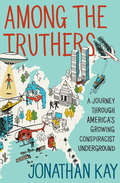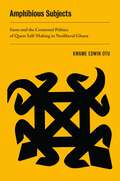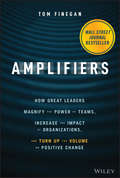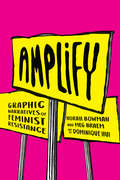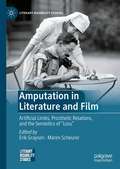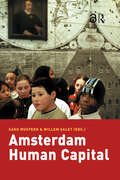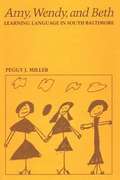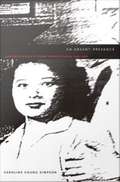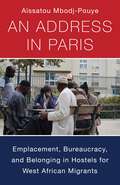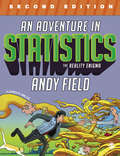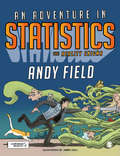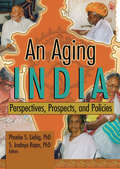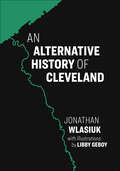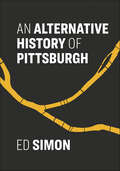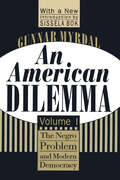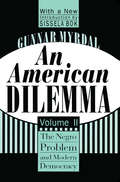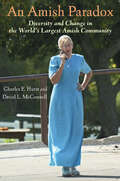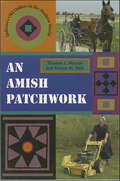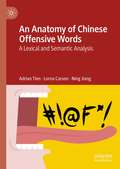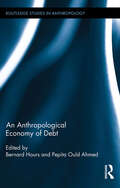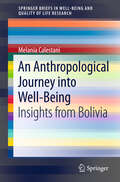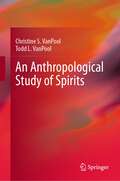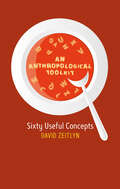- Table View
- List View
Among the Thugs
by Bill BufordThey have names like Barmy Bernie, Daft Donald, and Steamin' Sammy. They like lager (in huge quantities), the Queen, football clubs (especially Manchester United), and themselves. Their dislike encompasses the rest of the known universe, and England's soccer thugs express it in ways that range from mere vandalism to riots that terrorize entire cities. Now Bill Buford, editor of the prestigious journal Granta, enters this alternate society and records both its savageries and its sinister allure with the social imagination of a George Orwell and the raw personal engagement of a Hunter Thompson.
Among the Truthers: A Journey Through America's Growing Conspiracist Underground
by Jonathan KayFrom 9/11 conspiracy theorists and UFO obsessives tothe cult of Ayn Rand and Birthercrusaders, America is suffering from an explosion in post-rationalistideological movements. In Among the Truthers,journalist Jonathan Kay offers a thoughtful and sobering look at how socialnetworking and Web-based video sharing have engendered a flourishing of new conspiracism. Kay details the sociological profiles of tenbrands of modern conspiracists—the Failed Historian,the Mid-Life Crack-Up, the Damaged Survivor, the Campus Revolutionary, theStoner, the Clinical Case, the Puzzle Solver, the Christian Doomsayer, the CosmicVoyager, and the Egomaniac—in a compelling exploration of America’s departurefrom reason and what it means for the very future of rational discourse as thenation steps further into the 21st century.
Amphibious Subjects: Sasso and the Contested Politics of Queer Self-Making in Neoliberal Ghana (New Sexual Worlds #2)
by Kwame Edwin OtuA free open access ebook is available upon publication. Learn more at www.luminosoa.org.Amphibious Subjects is an ethnographic study of a community of self-identified effeminate men—known in local parlance as sasso—residing in coastal Jamestown, a suburb of Accra, Ghana's capital. Drawing on the Ghanaian philosopher Kwame Gyekye's notion of "amphibious personhood," Kwame Edwin Otu argues that sasso embody and articulate amphibious subjectivity in their self-making, creating an identity that moves beyond the homogenizing impulses of western categories of gender and sexuality. Such subjectivity simultaneously unsettles claims purported by the Christian heteronationalist state and LGBT+ human rights organizations that Ghana is predominantly heterosexual or homophobic. Weaving together personal interactions with sasso, participant observation, autoethnography, archival sources, essays from African and African-diasporic literature, and critical analyses of documentaries such as the BBC's The World’s Worst Place to Be Gay, Amphibious Subjects is an ethnographic meditation on how Africa is configured as the "heart of homophobic darkness" in transnational LGBT+ human rights imaginaries.
Amplifiers: How Great Leaders Magnify the Power of Teams, Increase the Impact of Organizations, and Turn Up the Volume on Positive Change
by Tom FineganDiscover how to enable strategic change efforts by relying on your best people In Amplifiers, entrepreneur and expert management and technology consultant Tom Finegan delivers an insightful new way to think about human behavior in the execution of corporate transformations. Through an exploration of the career journeys of several leaders and analyses of “True Amplifiers” in action, the book demonstrates how to deliver strategic and transformative change by relying on the efforts of key, exemplary followers. This important book: Explains the different ways that being a true amplifier is experienced by different ethnicities and genders Describes the “Cell Concept” of amplifiers, and how they interact with other stakeholders of your organization Discusses the work of amplifiers across global industries and organizations Perfect for executives, managers, and other business leaders responsible for change management and strategic execution, Amplifiers also belongs on the bookshelves of anyone who hopes to contribute to or lead organizations as they change direction.
Amplify: Graphic Narratives of Feminist Resistance
by Meg Braem Norah BowmanIn this highly original text – a collaboration between a college professor, a playwright, and an artist – graphic storytelling offers a unique way for readers to understand and engage with feminism and resistance in a more emotionally resonant way. Issues of performativity, gender roles, intersectionality, and privilege are explored in seven beautifully illustrated graphic vignettes. From Pussy Riot to the Women of the Black Panthers, and from Leymah Gbowee to Harsha Walia, each vignette highlights unique moments and challenges in the struggle for feminist social justice. Brief introductions provide enough background context for the uninitiated, while further readings offer opportunities for those who wish to learn more. Finally, carefully crafted discussion questions help readers probe the key points in each narrative while connecting specific stories to more general concepts in gender studies and feminist theory.
Amputation in Literature and Film: Artificial Limbs, Prosthetic Relations, and the Semiotics of "Loss" (Literary Disability Studies)
by Maren Scheurer Erik GraysonAmputation in Literature and Film: Artificial Limbs, Prosthetic Relations, and the Semiotics of “Loss” explores the many ways in which literature and film have engaged with the subject of amputation. The scholars featured in this volume draw upon a wide variety of texts, both lesser-known and canonical, across historical periods and language traditions to interrogate the intersections of disability studies with social, political, cultural, and philosophical concerns. Whether focusing on ancient texts by Zhuangzi or Ovid, renaissance drama, folktales collected by the Brothers Grimm, novels or silent film, the chapters in this volume highlight the dialectics of “loss” and “gain” in narratives of amputation to encourage critical dialogue and forge an integrated, embodied understanding of experiences of impairment in which mind and body, metaphor and materiality, theory and politics are considered as interrelated and interacting aspects of disability and ability.
Amsterdam Human Capital
by Sako Musterd Willem SaletThe familiar shape of western cities is changing dramatically. For long times the urban core was taken for granted as the focal point for international contacts and day-to-day activities in the region. Currently, the urban scope is transforming into multi centred forms at metropolitan scale. The transition is not just a matter of spatial form, it is reflecting social, economic and cultural processes. The question is what new identities may develop in such changing historical conditions of space and place.This book is a first attempt to analyse the process of urban transformation in an integral way. The focus is on the region of Amsterdam. All contributions are written by senior researchers of the Amsterdam studycentre for the Metropolitan Environment (AME). AME is the interdisciplinary urban research institute of the Universiteit van Amsterdam.As the urban research institute at the Universiteit van Amsterdam, the Amsterdam studycentre for the Metropolitan Environment (AME) analyses the economic, social and cultural aspects of this spatial transformation, usually in international comparative research. All contributions to this book are written by senior researchers of AME in an attempt to analyse in an integral way the present and future dilemmas out of the historical growth paths of this dynamic city.
Amy, Wendy, and Beth: Learning Language in South Baltimore
by Peggy J. MillerAmy, Wendy, and Beth, the 1980 recipient of the New York Academy of Sciences Edward Sapir Award, is a lively in-depth study of how three young children from an urban working-class community learned language under everyday conditions. It is a sensitive portrayal of the children and their families and offers an innovative approach to the study of language development and social class. A major conclusion of the study is that the linguistic abilities of working-class children are consistent with previous cross-cultural accounts of the development of communicational skills and, as such, lend no support to past claims that children from the lower classes are linguistically deprived. Instead, Amy, Wendy, and Beth emerge as able and enthusiastic language learners; their families, as caring and competent partners in the language socialization process. Sound scholarship and original findings about a hitherto neglected population of children lend special value to this work not only for scholars in psychology, linguistics, and anthropology, but for educators and policymakers as well.
An Absent Presence: Japanese Americans in Postwar American Culture, 1945-1960
by Caroline Chung SimpsonThere have been many studies on the forced relocation and internment of nearly 120,000 Japanese Americans during World War II. But An Absent Presence is the first to focus on how popular representations of this unparalleled episode in U. S. history affected the formation of Cold War culture. Caroline Chung Simpson shows how the portrayal of this economic and social disenfranchisement haunted--and even shaped--the expression of American race relations and national identity throughout the middle of the twentieth century. Simpson argues that when popular journals or social theorists engaged the topic of Japanese American history or identity in the Cold War era they did so in a manner that tended to efface or diminish the complexity of their political and historical experience. As a result, the shadowy figuration of Japanese American identity often took on the semblance of an "absent presence. " Individual chapters feature such topics as the case of the alleged Tokyo Rose, the Hiroshima Maidens Project, and Japanese war brides. Drawing on issues of race, gender, and nation, Simpson connects the internment episode to broader themes of postwar American culture, including the atomic bomb, McCarthyism, the crises of racial integration, and the anxiety over middle-class gender roles. By recapturing and reexamining these vital flashpoints in the projection of Japanese American identity, Simpson fills a critical and historical void in a number of fields including Asian American studies, American studies, and Cold War history.
An Address in Paris: Emplacement, Bureaucracy, and Belonging in Hostels for West African Migrants (Black Lives in the Diaspora: Past / Present / Future)
by Aïssatou Mbodj-PouyeAfter West African migrants arrived in France in the 1960s, the authorities opened residences for them known as “foyers.” Initially intended to contain the West African population, these hostels for single men fostered the emergence of Black communities in the heart of Paris and other cities. More recently, however, a nationwide renovation program sought to replace the collective living arrangements of foyers with more individualized spaces by constructing new buildings or drastically reshaping existing ones—and casting the West African presence as a threat to French identity.Aïssatou Mbodj-Pouye examines the changing roles that foyers have played in the lives of generations of West African migrants, weaving together rich ethnographic description with a critical historical account. She shows how migrants settled in foyers through kinship ties, making these buildings key parts of diasporic networks. Migrants also forged a sense of place in foyers, in an intricate relationship with bureaucratic requirements such as having an address. Mbodj-Pouye scrutinizes the physical and social evolution of foyers and the administrative dynamics that governed them. She argues that even though these buildings originated in state attempts to manage migrants along racial lines, the shared way of life that they encouraged helped spark a sense of political agency and belonging whose significance extends far beyond their walls.Combining close attention to the social and cultural meanings of the foyers and keenly observed portraits of Black experiences in France across decades, An Address in Paris offers a new lens on the global African diaspora.
An Adventure in Statistics: The Reality Enigma
by Andy FieldAPEX Award 2023 for Publication Excellence: Print Media - Education & Training Shortlisted for the British Psychological Society Book Award 2017 Shortlisted for the British Book Design and Production Awards 2016 Shortlisted for the Association of Learned & Professional Society Publishers Award for Innovation in Publishing 2016 Now in its second edition, An Adventure in Statistics: The Reality Enigma by best-selling author and award-winning teacher Andy Field offers a better way to learn statistics. It combines rock-solid statistics coverage with compelling visual storytelling to address the conceptual difficulties that students learning statistics for the first time often encounter in introductory courses. Students are guided away from rote memorization towards independent, critical thinking and problem solving. This essential foundation to understanding statistics is woven into the unique action-packed story of Zach, who thinks, processes information and faces challenges to his understanding in the same way as a statistics novice. Illustrated with stunning, graphic novel-style art and featuring Socratic dialogue, the story captivates readers as it introduces them to concepts, eliminating potential statistics anxiety. No previous statistics knowledge is presumed, and no use of data analysis software is required – everything you would expect for an introductory course is covered but with a contemporary twist, arming students with a strong grounding in understanding classical and Bayesian approaches to data analysis. With its unique combination of story, concepts and terminology, this complete introduction to statistics from bestselling author Andy Field breaks the mould to present a statistical tale like no other. Stay connected Join us on Facebook and share your experiences with Andy’s texts, check out news, access free stuff, see photos, watch videos, learn about competitions, and much more.
An Adventure in Statistics: The Reality Enigma
by Andy FieldAPEX Award 2023 for Publication Excellence: Print Media - Education & Training Shortlisted for the British Psychological Society Book Award 2017 Shortlisted for the British Book Design and Production Awards 2016 Shortlisted for the Association of Learned & Professional Society Publishers Award for Innovation in Publishing 2016 Now in its second edition, An Adventure in Statistics: The Reality Enigma by best-selling author and award-winning teacher Andy Field offers a better way to learn statistics. It combines rock-solid statistics coverage with compelling visual storytelling to address the conceptual difficulties that students learning statistics for the first time often encounter in introductory courses. Students are guided away from rote memorization towards independent, critical thinking and problem solving. This essential foundation to understanding statistics is woven into the unique action-packed story of Zach, who thinks, processes information and faces challenges to his understanding in the same way as a statistics novice. Illustrated with stunning, graphic novel-style art and featuring Socratic dialogue, the story captivates readers as it introduces them to concepts, eliminating potential statistics anxiety. No previous statistics knowledge is presumed, and no use of data analysis software is required – everything you would expect for an introductory course is covered but with a contemporary twist, arming students with a strong grounding in understanding classical and Bayesian approaches to data analysis. With its unique combination of story, concepts and terminology, this complete introduction to statistics from bestselling author Andy Field breaks the mould to present a statistical tale like no other. Stay connected Join us on Facebook and share your experiences with Andy’s texts, check out news, access free stuff, see photos, watch videos, learn about competitions, and much more.
An Adventure in Statistics: The Reality Enigma
by Professor Andy FieldShortlisted for the British Psychological Society Book Award 2017 Shortlisted for the British Book Design and Production Awards 2016 Shortlisted for the Association of Learned & Professional Society Publishers Award for Innovation in Publishing 2016 An Adventure in Statistics: The Reality Enigma by best-selling author and award-winning teacher Andy Field offers a better way to learn statistics. It combines rock-solid statistics coverage with compelling visual story-telling to address the conceptual difficulties that students learning statistics for the first time often encounter in introductory courses - guiding students away from rote memorization and toward critical thinking and problem solving. Field masterfully weaves in a unique, action-packed story starring Zach, a character who thinks like a student, processing information, and the challenges of understanding it, in the same way a statistics novice would. Illustrated with stunning graphic novel-style art and featuring Socratic dialogue, the story captivates readers as it introduces them to concepts, eliminating potential statistics anxiety. The book assumes no previous statistics knowledge nor does it require the use of data analysis software. It covers the material you would expect for an introductory level statistics course that Field’s other books (Discovering Statistics Using IBM SPSS Statistics and Discovering Statistics Using R) only touch on, but with a contemporary twist, laying down strong foundations for understanding classical and Bayesian approaches to data analysis. In doing so, it provides an unrivalled launch pad to further study, research, and inquisitiveness about the real world, equipping students with the skills to succeed in their chosen degree and which they can go on to apply in the workplace. The Story and Main Characters The Reality Revolution In the City of Elpis, in the year 2100, there has been a reality revolution. Prior to the revolution, Elpis citizens were unable to see their flaws and limitations, believing themselves talented and special. This led to a self-absorbed society in which hard work and the collective good were undervalued and eroded. To combat this, Professor Milton Grey invented the reality prism, a hat that allowed its wearers to see themselves as they really were - flaws and all. Faced with the truth, Elpis citizens revolted and destroyed and banned all reality prisms. The Mysterious Disappearance Zach and Alice are born soon after all the prisms have been destroyed. Zach, a musician who doesn’t understand science, and Alice, a geneticist who is also a whiz at statistics, are in love. One night, after making a world-changing discovery, Alice suddenly disappears, leaving behind a song playing on a loop and a file with her research on it. Statistics to the Rescue! Sensing that she might be in danger, Zach follows the clues to find her, as he realizes that the key to discovering why Alice has vanished is in her research. Alas! He must learn statistics and apply what he learns in order to overcome a number of deadly challenges and find the love of his life. As Zach and his pocket watch, The Head, embark on their quest to find Alice, they meet Professor Milton Grey and Celia, battle zombies, cross a probability bridge, and encounter Jig:Saw, a mysterious corporation that might have something to do with Alice’s disappearance… Author News "Eight years ago I had the idea to write a fictional story through which the student learns statistics via a shared adventure with the main character..." Read the complete article from Andy Field on writing his new book Times Higher Education article: “Andy Field takes statistics adventure to a new level” Stay Connected Connect with us on Facebook and share your experiences with Andy’s texts, check out news, access free stuff, see photos, watch videos, learn about competitions, and much more. Video Links Go behind the scenes and learn more about the man behind the book: Watch Andy talk about why he created a statistics book using the framework of a novel and illustratio
An Aging India: Perspectives, Prospects, and Policies
by S. Irudaya Rajan Phoebe S LiebigExplore Indian policy and practice on aging from a variety of perspectives! This pathbreaking collection provides something that has been missing in the literature on aging in India, especially for non-Indian audiences: studies of various aspects of aging in India combined with analyses of current policies, policy trends and recommendations. You'll examine aging issues from a variety of perspectives-demographic foundations, social and family relations, economics, health and disability, current interventions, and advocacy and policy. An Aging India also provides you with up-to-date references, explanations of differences and similarities within India's diverse population, examples of programs in various settings including a geriatric hospital, a major NGO, and old-age homes, and an overview of the development of India's national policy on aging. Where appropriate, comparisons with U.S. policy approaches are noted. An Aging India: Perspectives, Prospects, and Policies examines: the demography of aging in India the current state of research on aging, and the pitfalls associated with that research income, poverty, and the problems created by the lack of any widespread retirement income system in India the health status of Indian elders and what their healthcare prospects are the situation for the disabled elderly in India elder abuse in the Indian context social networks and grassroots organizations for seniors in India the role of Indian geriatric hospitals and old-age homes The insights of the top researchers and practitioners who contributed to An Aging India: Perspectives, Prospects, and Policies will strike home with their counterparts around the world. Make this book a part of your professional/teaching collection today!
An Alternative History of Cleveland
by Jon WlasiukDive into Cleveland&’s deep past and return with a new vision for how we should think about the region today. The land we call &“northeast Ohio&” was originally forged through eons of glacial pressure, geologic shifts, and the relentless movement of the Cuyahoga River. Since the last Ice Age, however, it has also been transformed countless times by the many people who have called it home. In An Alternative History of Cleveland, Jon Wlasiuk uncovers the mysteries, devastations, and human incursions that have shaped the region. Here, you&’ll encounter the giant megafauna that roamed the area until their mysterious extinction, Indigenous civilizations who first shaped the land and harnessed its natural resources, industrial pioneers like John D. Rockefeller and Charles Brush who corralled electricity and crude oil in the service of capitalist progress, the environmental devastation that polluted the Cuyahoga and caused toxic algae blooms in Lake Erie, and the numerous Clevelanders today who want to reshape the city&’s relationship with the natural environment. Though separated by thousands of years, these stories contain a common theme: the city of Cleveland remains bound to nature, despite our best efforts to liberate ourselves from its limits. Part natural history, part archeological essay, and part a contemporary call to arms to reclaim and rewild Cleveland&’s future, this unforgettable trek into the heart of &“the Land&” will change the way you see the city forever. Praise for An Alternative History of Cleveland: "A stunning accomplishment." —Dr. John Grabowski, editor, Encyclopedia of Cleveland History "Wlasiuk is a dazzling storyteller, weaving the threads that connect ancient swamps to the Agora, or giant sloths to Public Square, all in the service of illuminating the inextricable tether we have to the plants, animals, and waterways around us." —Raechel Anne Jolie, author of Rust Belt Femme"I read Jon Wlasiuk&’s marvelous deep-time history of Cleveland with a sense of awe. A story of place that&’s this well-done, this accessible to the public, and with this sort of fascinating arc through time is going to rearrange the furniture in every reader&’s head." —Dan Flores, New York Times best-selling author of Wild New World and Coyote America
An Alternative History of Pittsburgh
by Ed Simon&“[An] epic, atomic history of the Steel City . . . a work of literature, a series of linked creative nonfiction essays, an historical story cycle.&” ―Phillip Maciak, Los Angeles Review of Books The land surrounding the confluence of the Allegheny, Monongahela, and Ohio rivers has supported communities of humans for millennia. Over the past four centuries, however, it has been transformed countless times by the many people who call it home. In this brief, lyrical, and idiosyncratic collection, Ed Simon, a staff writer at The Millions, follows the story of Pittsburgh through a series of interconnected segments, covering all manner of beloved people, places, and things, including: • Paleolithic Pittsburgh • The Whiskey Rebellion • The attempted assassination of Henry Frick • The Harmonists • The Mystery, Pittsburgh&’s radical, Black nationalist newspaper • The myth of Joe Magarac • Billy Strayhorn, Duke Ellington, Andy Warhol, and much, much more. Accessible and funny, An Alternative History of Pittsburgh is a must-read for anyone curious about this storied city, and for Pittsburghers who think they know it all too well already. &“[A] rich and idiosyncratic history . . . Even Pittsburgh history buffs will learn something new.&” —Publishers Weekly &“Simon tells the story of the city and all the changes that made it what it is today in a way that's entirely new, by the hand of someone who is deeply familiar.&” ―Juliana Rose Pignataro, Newsweek &“A sparkling new take on everyone&’s favorite Rust Belt metropolis.&” ―Justin Velluci, Jewish Chronicle &“A brilliant look at how geology and art, politics and religion, disaster and luck combine to build America&’s great cities―one that will leave you wondering what secrets your own hometown might be hiding.&” ―Anjali Sachdeva, author of All the Names They Used for God
An American Dilemma: The Negro Problem and Modern Democracy, Volume 1 (Black & African-American Studies)
by Gunnar MyrdalIn this landmark effort to understand African American people in the New World, Gunnar Myrdal provides deep insight into the contradictions of American democracy as well as a study of a people within a people. The title of the book, 'An American Dilemma', refers to the moral contradiction of a nation torn between allegiance to its highest ideals and awareness of the base realities of racial discrimination. The touchstone of this classic is the jarring discrepancy between the American creed of respect for the inalienable rights to freedom, justice, and opportunity for all and the pervasive violations of the dignity of blacks. The appendices are a gold mine of information, theory, and methodology. Indeed, two of the appendices were issued as a separate work given their importance for systematic theory in social research. The new introduction by Sissela Bok offers a remarkably intimate yet rigorously objective appraisal of Myrdal—a social scientist who wanted to see himself as an analytic intellectual, yet had an unbending desire to bring about change. 'An American Dilemma' is testimonial to the man as well as the ideas he espoused. When it first appeared 'An American Dilemma' was called "the most penetrating and important book on contemporary American civilization" by Robert S. Lynd; "One of the best political commentaries on American life that has ever been written" in The American Political Science Review; and a book with "a novelty and a courage seldom found in American discussions either of our total society or of the part which the Negro plays in it" in 'The American Sociological Review'. It is a foundation work for all those concerned with the history and current status of race relations in the United States.
An American Dilemma: The Negro Problem and Modern Democracy, Volume 2 (Black And African-american Studies)
by Gunnar MyrdalIn this landmark effort to understand African American people in the New World, Gunnar Myrdal provides deep insight into the contradictions of American democracy as well as a study of a people within a people. The title of the book, An American Dilemma, refers to the moral contradiction of a nation torn between allegiance to its highest ideals and awareness of the base realities of racial discrimination. The touchstone of this classic is the jarring discrepancy between the American creed of respect for the inalienable rights to freedom, justice, and opportunity for all and the pervasive violations of the dignity of blacks.The appendices are a gold mine of information, theory, and methodology. Indeed, two of the appendices were issued as a separate work given their importance for systematic theory in social research. The new introduction by Sissela Bok offers a remarkably intimate yet rigorously objective appraisal of Myrdal—a social scientist who wanted to see himself as an analytic intellectual, yet had an unbending desire to bring about change. An American Dilemma is testimonial to the man as well as the ideas he espoused.When it first appeared An American Dilemma was called "the most penetrating and important book on contemporary American civilization" by Robert S. Lynd; "One of the best political commentaries on American life that has ever been written" in The American Political Science Review; and a book with "a novelty and a courage seldom found in American discussions either of our total society or of the part which the Negro plays in it" in The American Sociological Review. It is a foundation work for all those concerned with the history and current status of race relations in the United States.
An Amish Paradox: Diversity and Change in the World's Largest Amish Community (Young Center Books in Anabaptist and Pietist Studies)
by Charles E. Hurst David L. McConnellWinner, 2011 Dale Brown Book Award for Outstanding Scholarship in Anabaptist and Pietist Studies. Young Center for Anabaptist and Pietist Studies at Elizabethtown CollegeHolmes County, Ohio, is home to the largest and most diverse Amish community in the world. Yet, surprisingly, it remains relatively unknown compared to its famous cousin in Lancaster, Pennsylvania. Charles E. Hurst and David L. McConnell conducted seven years of fieldwork, including interviews with over 200 residents, to understand the dynamism that drives social change and schism within the settlement, where Amish enterprises and nonfarming employment have prospered. The authors contend that the Holmes County Amish are experiencing an unprecedented and complex process of change as their increasing entanglement with the non-Amish market causes them to rethink their religious convictions, family practices, educational choices, occupational shifts, and health care options. The authors challenge the popular image of the Amish as a homogeneous, static, insulated society, showing how the Amish balance tensions between individual needs and community values. They find that self-made millionaires work alongside struggling dairy farmers; successful female entrepreneurs live next door to stay-at-home mothers; and teenagers both embrace and reject the coming-of-age ritual, rumspringa. An Amish Paradox captures the complexity and creativity of the Holmes County Amish, dispelling the image of the Amish as a vestige of a bygone era and showing how they reinterpret tradition as modernity encroaches on their distinct way of life.
An Amish Patchwork: Indiana's Old Orders in the Modern World
by Steven M. Nolt Thomas J. MeyersIndiana is home to the world's third-largest Amish population. Indiana's 19 Old Order Amish and two Old Order Mennonite communities show a surprising diversity despite all that unites them as a distinct culture. This contemporary portrait of Indiana's Amish is the first book-length overview of Amish in the state. Thomas J. Meyers and Steven M. Nolt present an overview of the beliefs and values of the Amish, their migration history, and the differences between the state's two major Amish ethnic groups (Pennsylvania Dutch and Swiss). They also talk about Indiana's Old Order Mennonites, a group too often confused with the Amish. Meyers and Nolt situate the Amish in their Indiana context, noting an involvement with Indiana's industrial economy that may surprise some. They also treat Amish interaction with state government over private schooling and other matters, and the relationship of the Amish to their neighbors and the tourist industry. This valuable introduction to the Indiana Amish deserves a place on every Hoosier's bookshelf.
An Anatomy of Chinese Offensive Words: A Lexical and Semantic Analysis
by Lorna Carson Ning Jiang Adrian TienThis book offers a precise and rigorous analysis of the meanings of offensive words in Chinese. Adopting a semantic and cultural approach, the authors demonstrate how offensive words can and should be systematically researched, documented and accounted for as a valid aspect of any language. The book will be of interest to academics, practitioners and students of sociolinguistics, language and culture, linguistic taboo, Chinese studies and Chinese linguistics.
An Anthropological Economy of Debt (Routledge Studies in Anthropology #21)
by Pepita Ould Ahmed Bernard HoursDebt is often thought of as a mere economic variable governed by a simplistic mechanical logic, ignoring its other facets. Whose debt, and debt of what exactly? This volume analyzes debt as a political and social construct, with a multiplicity of purposes and agents. All of these are vectors of meanings that are highly diverse, and of subtle distinctions; they show that debt is a transverse phenomenon, cutting across spaces that are not merely economic but also domestic, social and political. Each contributor takes a fresh view of the subject, dealing with debt at a different time, in a different society, on a different scale of observation. By adopting a determinedly interdisciplinary approach, the authors reveal in the phenomenon of debt a diversity of social and gendered determinants that amount in some cases to domination, allegiance or slavery, and in others to solidarity and emancipation. Debt is at one and the same time shared, imposed, political and gendered.
An Anthropological Journey into Well-Being: Insights from Bolivia (SpringerBriefs in Well-Being and Quality of Life Research)
by Melania CalestaniThis volume is a unique contribution to the exploration of a new perspective in the study of well-being, which tries to overcome the quantification bias by creating an account of 'the good life' in a specific place. Rather than numbers, this research focuses on local narratives, emphasising the urgent need to include a wider range of methodological approaches when engaging with well-being. The volume demonstrates through the Bolivian case study the value of qualitative research for well-being studies. It shows the potential to integrate predominant quantitative data with qualitative outcomes, such as those emerging through ethnography. It is aimed at academics, researchers and students in well-being/quality of life studies, as well as audiences in the non-profit, governmental and policy in the non-profit, governmental and policy sectors. The book provides new perspectives in achieving better indicators of well-being and quality-of-life.
An Anthropological Study of Spirits
by Todd L. VanPool Christine S. VanPoolThis book discusses the cultural importance of spirits, what spirits want, and how humans interact with them, using examples from around the world and through time. Examples range from the vengeful spirits of the Zulu that cast lightning bolts from clear skies to punish wrongdoers, to the benevolent Puebloan Kachina that encourage prosperity, safety, and rain in the arid American Southwest. The case studies illustrate how humans seek to cooperate (or counteract) spirits to heal the physical and spiritual ailments of their people, to divine the truth, or to gain resources. Building from their cross-cultural analyses, the authors further discuss how our physiology and psychology impact our interaction with the spirits. Readers will come away with an appreciation of the beauty and power of the spirits that continue to shape the lives of people around the world.
An Anthropological Toolkit: Sixty Useful Concepts
by David ZeitlynPresenting sixty theoretical ideas, David Zeitlyn asks ‘How to write about anthropological theory without making a specific theoretical argument.’ “David Zeitlyn has written a wryly engaging, short book on, essentially, why we should not become theoretical partisans—that, indeed, being a serious theorist means accepting precisely that principle.”—Michael Herzfeld, Harvard University To answer, he offers a series of mini essays about an eclectic collection of theoretical concepts that he has found helpful over the years. The book celebrates the muddled inconsistencies in the ways that humans live their messy lives. There are, however, still patterns discernible: the actors can understand what is going on, they see an event unfolding in ways that are familiar, as belonging to a certain type and therefore, Zeitlyn suggests, so can researchers. From the introduction: This book promotes an eclectic, multi-faceted anthropology in which multiple approaches are applied in pursuit of the limited insights which each can afford…. I do not endorse any one of these idea as supplying an exclusive path to enlightenment: I absolutely do not advocate any single position. As a devout nonconformist, I hope that the following sections provide material, ammunition and succour to those undertaking nuanced anthropological analysis (and their kin in related disciplines)…. Mixing up or combining different ideas and approaches can produce results that, in their breadth and richness, are productive for anthropology and other social sciences, reflecting the endless complexities of real life. …This is my response to the death of grand theory. I see our task as learning how to deal with that bereavement and how to resist the siren lures of those promising synoptic overviews. This book is relevant to anthropology, communication studies, cultural studies and sociology.

